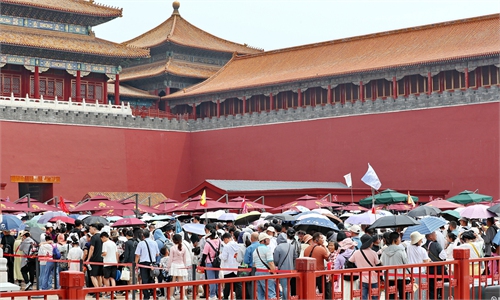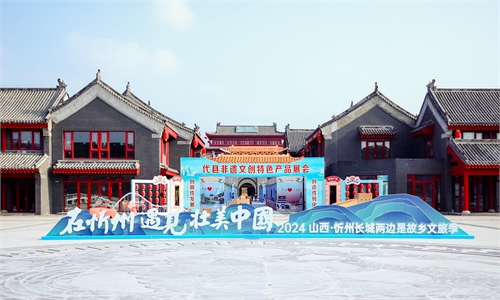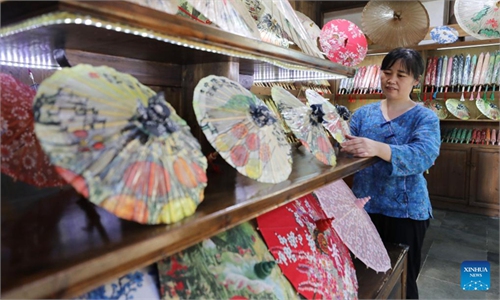ARTS / CULTURE & LEISURE
Ending reservation requirements benefits tourism
Following Beijing's announcement that most tourist spots in the city will no longer require reservations starting from June 20, other cities, including Shanghai, Suzhou in East China's Jiangsu Province, and Hangzhou in East China's Zhejiang Province, have also joined the trend.

China's tourist sites rating system classifies attractions into five categories based on their quality and services, ranging from A to 5A, with the 5A rating being the highest.
According to the implementation details, all A-level tourist attractions, excluding cultural and historical museums, are exempt from reservation requirements. For popular attractions during statutory holidays with large visitor volumes, measures such as flow control, peak-time advice, and staggered entry will be implemented to ensure visitors have a comfortable experience.
Meanwhile, A-level cultural and historical museums will also cancel reservation requirements during weekdays and non-statutory holidays, except for group tours. It's worth noting that for weekends and statutory holidays when large visitor volume necessitates reservations, mechanisms will be optimized to simplify the process while retaining options such as "manual booking and phone reservations."
The reservation system for tourist attractions can be seen as efforts that local governments have made to "enhance basic service quality at summer tourist attractions."
For example, the Beijing Municipal Bureau of Culture and Tourism requires all tourist attractions to provide high-quality cultural and tourism experiences. During the summer season, they should install additional sun and rain shelters (such as umbrellas), shaded rest areas, and seating to prevent heatstroke. Temporary restrooms should be added according to summer visitor flow, and more cleaning staff should be deployed to increase the frequency of cleaning and garbage removal.
Additionally, they are asked to ensure the supply of reasonably priced water, food, other heat-relief beverages and light meals, wheelchairs and small medical kits.
According to media reports, some tourist attractions have asked consumers to provide ID information to make reservations, but many foreigners find this difficult as some reservation interfaces do not have the option to enter a passport number to make a reservation.
The cancellation of reservation requirements at tourist attractions offers several benefits. First, it provides greater accessibility and spontaneity for visitors, allowing them to visit without having to plan in advance. This flexibility can increase overall tourist satisfaction and potentially attract more visitors who prefer to make last-minute travel decisions.
Moreover, it simplifies management for both tourists and staff, reducing the administrative burden of managing reservations. This can lead to more streamlined and efficient entry, minimizing wait times and enhancing visitor experience.
Due to the increase of domestic students and foreign visitors during summer, the cancellation of reservation requirements is even more convenient. This move enables foreign visitors to explore China in a more straightforward manner, which also reflects the country's hospitality and warmth toward overseas tourists.
China's visa-free policy for citizens of multiple countries and the "ChinaTravel" trend on overseas social media platforms have attracted many foreign tourists to explore special tourism experiences in China.
Since the implementation of the country's visa-free entry policy, bookings for inbound tourism during the summer have doubled, with tourists from 14 countries including France, Italy, Germany, Malaysia, and Thailand showing a 150 percent increase in inbound travel to China. Cities such as Shanghai, Beijing, Guangzhou, Chengdu, Xi'an, Shenzhen, Qingdao, Hangzhou, Chongqing, and Kunming have been popular destinations for inbound tourism, according to a report released by online travel platform Ctrip.
Summer vacation has always been a peak travel season. In response to the high demand during summer, the cancellation of reservation requirements at certain tourist attractions is sure to help long-distance travelers avoid unnecessary hassles, thereby boosting tourism development and consumption. For long-distance travelers, the inflexible planning due to reservation requirements at attractions can easily dampen enthusiasm for travel.
However, the cancellation of reservations at tourist attractions can have several disadvantages if not managed properly. First, it can result in overcrowding, diminishing the visitor experience due to long wait times and overcrowded facilities. Overcapacity can also strain infrastructure, potentially leading to quicker wear and tear and higher maintenance costs. With no reservations required, it becomes challenging to manage visitor flow and ensure balanced visitor distribution throughout the day.
Furthermore, the lack of reservation data makes it difficult to predict and prepare for peak times, impacting staffing and resource allocation. Overall, while removing reservation requirements will offer more flexibility, it can also lead to issues for both the tourist sites and their visitors.
To sum up, detailed planning is needed to ensure the smooth operation of the tourist sites and provide memorable tourist experience.
The author is a reporter with the Global Times. life@globaltimes.com.cn

Illustration: Chen Xia/GT
The cancellation of reservation requirements for all A-level tourist attractions was announced by the Hangzhou Municipal Bureau of Culture, Radio, TV, and Tourism on Sunday, with all A-level tourist attractions across Hangzhou no longer requiring visitors to reserve tickets for entry.China's tourist sites rating system classifies attractions into five categories based on their quality and services, ranging from A to 5A, with the 5A rating being the highest.
According to the implementation details, all A-level tourist attractions, excluding cultural and historical museums, are exempt from reservation requirements. For popular attractions during statutory holidays with large visitor volumes, measures such as flow control, peak-time advice, and staggered entry will be implemented to ensure visitors have a comfortable experience.
Meanwhile, A-level cultural and historical museums will also cancel reservation requirements during weekdays and non-statutory holidays, except for group tours. It's worth noting that for weekends and statutory holidays when large visitor volume necessitates reservations, mechanisms will be optimized to simplify the process while retaining options such as "manual booking and phone reservations."
The reservation system for tourist attractions can be seen as efforts that local governments have made to "enhance basic service quality at summer tourist attractions."
For example, the Beijing Municipal Bureau of Culture and Tourism requires all tourist attractions to provide high-quality cultural and tourism experiences. During the summer season, they should install additional sun and rain shelters (such as umbrellas), shaded rest areas, and seating to prevent heatstroke. Temporary restrooms should be added according to summer visitor flow, and more cleaning staff should be deployed to increase the frequency of cleaning and garbage removal.
Additionally, they are asked to ensure the supply of reasonably priced water, food, other heat-relief beverages and light meals, wheelchairs and small medical kits.
According to media reports, some tourist attractions have asked consumers to provide ID information to make reservations, but many foreigners find this difficult as some reservation interfaces do not have the option to enter a passport number to make a reservation.
The cancellation of reservation requirements at tourist attractions offers several benefits. First, it provides greater accessibility and spontaneity for visitors, allowing them to visit without having to plan in advance. This flexibility can increase overall tourist satisfaction and potentially attract more visitors who prefer to make last-minute travel decisions.
Moreover, it simplifies management for both tourists and staff, reducing the administrative burden of managing reservations. This can lead to more streamlined and efficient entry, minimizing wait times and enhancing visitor experience.
Due to the increase of domestic students and foreign visitors during summer, the cancellation of reservation requirements is even more convenient. This move enables foreign visitors to explore China in a more straightforward manner, which also reflects the country's hospitality and warmth toward overseas tourists.
China's visa-free policy for citizens of multiple countries and the "ChinaTravel" trend on overseas social media platforms have attracted many foreign tourists to explore special tourism experiences in China.
Since the implementation of the country's visa-free entry policy, bookings for inbound tourism during the summer have doubled, with tourists from 14 countries including France, Italy, Germany, Malaysia, and Thailand showing a 150 percent increase in inbound travel to China. Cities such as Shanghai, Beijing, Guangzhou, Chengdu, Xi'an, Shenzhen, Qingdao, Hangzhou, Chongqing, and Kunming have been popular destinations for inbound tourism, according to a report released by online travel platform Ctrip.
Summer vacation has always been a peak travel season. In response to the high demand during summer, the cancellation of reservation requirements at certain tourist attractions is sure to help long-distance travelers avoid unnecessary hassles, thereby boosting tourism development and consumption. For long-distance travelers, the inflexible planning due to reservation requirements at attractions can easily dampen enthusiasm for travel.
However, the cancellation of reservations at tourist attractions can have several disadvantages if not managed properly. First, it can result in overcrowding, diminishing the visitor experience due to long wait times and overcrowded facilities. Overcapacity can also strain infrastructure, potentially leading to quicker wear and tear and higher maintenance costs. With no reservations required, it becomes challenging to manage visitor flow and ensure balanced visitor distribution throughout the day.
Furthermore, the lack of reservation data makes it difficult to predict and prepare for peak times, impacting staffing and resource allocation. Overall, while removing reservation requirements will offer more flexibility, it can also lead to issues for both the tourist sites and their visitors.
To sum up, detailed planning is needed to ensure the smooth operation of the tourist sites and provide memorable tourist experience.
The author is a reporter with the Global Times. life@globaltimes.com.cn




